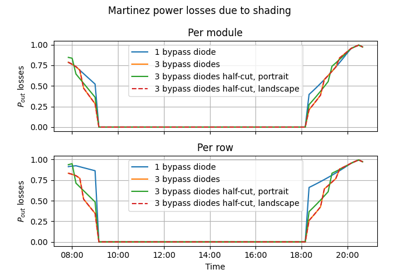pvlib.irradiance.perez_driesse#
- pvlib.irradiance.perez_driesse(surface_tilt, surface_azimuth, dhi, dni, dni_extra, solar_zenith, solar_azimuth, airmass=None, return_components=False)[source]#
Determine diffuse irradiance from the sky on a tilted surface using the continuous Perez-Driesse model.
The Perez-Driesse model [1] is a reformulation of the 1990 Perez model [2] that provides continuity of the function and of its first derivatives. This is achieved by replacing the look-up table of coefficients with quadratic splines.
- Parameters:
surface_tilt (numeric) – Surface tilt angle. See surface_tilt. [°]
surface_azimuth (numeric) – Surface azimuth angle. See surface_azimuth. [°]
dhi (numeric) – Diffuse horizontal irradiance, must be >=0. [Wm⁻²]
dni (numeric) – Direct normal irradiance, must be >=0. [Wm⁻²]
- dni_extranumeric
Extraterrestrial normal irradiance. [Wm⁻²]
- solar_zenithnumeric
apparent (refraction-corrected) zenith angle. [°]
- solar_azimuthnumeric
Solar azimuth angle. See solar_azimuth. [°]
- airmassnumeric, optional
Relative (not pressure-corrected) airmass values. If
airmassis a DataFrame it must be of the same size as all other DataFrame inputs. AM must be >=0 (careful using the 1/sec(z) model of AM generation). [unitless]- return_components: bool (optional, default=False)
Flag used to decide whether to return the calculated diffuse components or not.
- Returns:
numeric, OrderedDict, or DataFrame – Return type controlled by return_components argument. If
return_components=False, sky_diffuse is returned. Ifreturn_components=True, diffuse_components is returned.sky_diffuse (numeric) – The sky diffuse component of the solar radiation on a tilted surface.
diffuse_components (OrderedDict (array input) or DataFrame (Series input)) –
- Keys/columns are:
sky_diffuse: Total sky diffuse
isotropic
circumsolar
horizon
Notes
The Perez-Driesse model can be considered a plug-in replacement for the 1990 Perez model using the
'allsitescomposite1990'coefficient set. Deviations between the two are very small, as demonstrated in [1]. Other coefficient sets are not supported because the 1990 set is based on the largest and most diverse set of empirical data.References
Examples using pvlib.irradiance.perez_driesse#

Modelling shading losses in modules with bypass diodes
